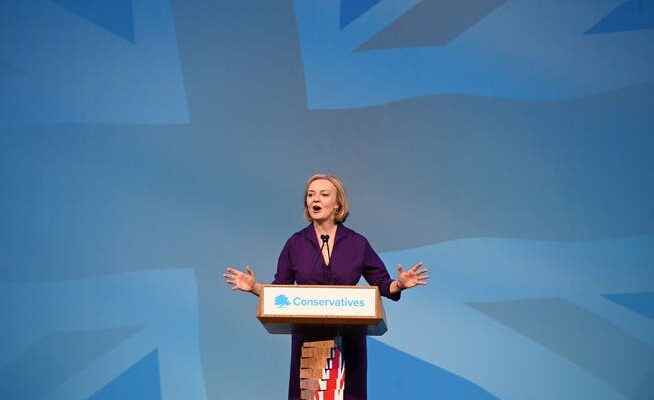Liz Truss has won the debate over Boris Johnson’s successor less clearly than expected. On Tuesday, the new Prime Minister will move into 10 Downing Street, where she will soon present an emergency plan to cut energy prices.
After the election results were announced, the new Conservative party leader Liz Truss spoke to party representatives in London.
Two months after Prime Minister Boris Johnson announced his resignation, the British Tories announced on Monday the result of the protracted debate over his successor as party leader. As expected, the previous Secretary of State Liz Truss prevailed. She was able to unite 57.4 percent of the votes of the approximately 140,000 Tory members who took part in the election. Her rival, former finance minister Rishi Sunak, got 42.6 percent, better than the polls had suggested.
Audience with the Queen in Scotland
Truss will officially take office on Tuesday and will fill the first key positions in the cabinet. It remains to be seen whether it will primarily include representatives of the party’s right wing or whether it will also include MPs from Sunak’s centrist camp in order to broaden support in the party and parliamentary group.
Before taking office on Tuesday, the Queen will first receive Boris Johnson for a farewell visit and then instruct Truss to form a government on her behalf. Normally, when there is a change of government, the monarch receives the outgoing and new head of government at Buckingham Palace in London.
However, as the 96-year-old Queen suffers from “mobility problems”, Johnson and Truss will fly to Scotland on Tuesday, where the Queen is staying at her summer residence at Balmoral Castle. Elizabeth II has already seen fourteen prime ministers during her reign, and Truss is now the 15th incumbent. After Margaret Thatcher and Theresa May, Truss is the third woman to move into 10 Downing Street.
“I will deliver”
Truss takes over the business of government at a difficult time. Energy prices are skyrocketing, inflation is around 10 percent and the Bank of England is forecasting a recession. Speaking briefly to party officials in London, Truss said she would tackle the burning issues and come up with “bold” and conservative solutions to bring the Tories back to victory in the 2024 general election. “I’ll deliver,” she promised.
Specifically, she named tax cuts and measures to boost economic growth. As a further priority, she also described the state health service NHS, which will soon swallow 40 percent of the British budget and suffer from increasingly dramatic capacity bottlenecks.
Rapid measures against energy crisis
The British are particularly concerned about the rising energy prices. Currently, energy suppliers can only charge an average household a maximum of £1971 per year. This price cap will rise to £3,549 in October, and annual electricity prices per household are likely to rise to £5,300 in January. That would be about five times what Britain paid for energy between 2018 and 2021.
Truss wants to present a new plan within a week. In the longer term, it is likely to look to improve energy security and invest in the production of new oil and gas in the North Sea, which the UK has planned to scale back to meet its climate targets. With a view to the short-term price shock, Truss initially stated that she only wanted to relieve the British with tax cuts. But now it is becoming apparent that she also wants to help them with financial measures.
There is even talk of freezing electricity prices over the winter, which could cost a high double-digit billion amount. Of course, this would narrow the scope for the tax cuts and additional spending promised by Truss.
The aftermath of Brexit
With Liz Truss, Great Britain has already received its fourth new head of government within six years. The attrition is a testament to the turmoil the country and the Conservative Party have endured since the 2016 Brexit vote. Even if the economic situation, energy prices and the war in Ukraine dominate the agenda today, the aftermath of leaving the EU will also concern Truss.
The conflict between London and Brussels over the Northern Ireland Protocol threatens to escalate. In addition, Brexit is causing political instability in Northern Ireland and Scotland, where the nationalists want to hold a new independence referendum in 2023.
